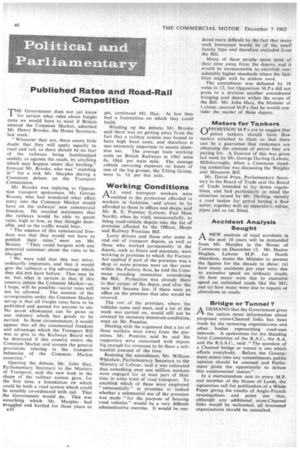Published Rates and Road-Rail Competition
Page 48

If you've noticed an error in this article please click here to report it so we can fix it.
HE Government does not yet know 1 for certain what rules about freight rates we would have to meet if Britain entered the Common Market, admitted Mr. Henry Brooke, the Home Secretary, last week.
"Whatever they are, there seems little doubt that they will apply equally to road and rail, so there should be no fear of the railways being handicapped unduly, as against the roads, by anything which may happen under that heading," forecast Mr. Brooke, who was "standing in" for a sick Mr. Marples during a Commons debate on the Transport Commission.
Mr. Brooke was replying to Opposition transport spokesman, Mr. George Strauss, who had wondered what effect entry into the Common Market Would have on the railways' new commercial freedom. He recalled statements that the railways would be able to quote rates, high or low, as they thought desirable, and as the traffic would bear.
"The essence of this commercial freedom was that they would not have to publish their rates," went on Mr. Strauss. "They could bargain with any potential customer about the rates to be charged.
"We were told that this was extraordinarily important, and that it would give the railways a big advantage which they did not have before. That may be, so, but what is certain is that if this country:enters the Common Market—as, I hope, will be possible—secret rates will
not be allowed. The essence of the arrangements under the Common Market set-up is that all freight rates have to be published and quoted for anyone to see. No secret allowances can be given to any industry which has goods to be carried. In those circumstances, it would appear that all the commercial freedom and advantage which the Transport Bill was to give to the Railways Board will be destroyed if this country enters the Common Market and accepts the general provisions relating to the transport industries of the Common Market countries."
Opening the debate, Mr. John Hay, Parliamentary Secretary to the Ministry of Transport, said the new look in the shape of the railway system gave, for the first time, a foundation on which could be built a road system which could be sensibly co-ordinated with rail. That the Government would do. This was something which Mr. Marples had struggled and battled for three years to B30 get, corninued Mr. Hay. At last they had a foundation , on which they could build.
Winding up the debate, Mr. Brooke said there was no getting away from the fact that a railway system was bound to have high fixed costs, and therefore it was extremely important to secure inten sive use. The average train working costs on British Railways in 1961 were 65. 101d. per train mile. The average vehicle operating expenses on buses of one of the big groups, the Tilling Group, were Is. 7d. per bus mile.




























































































































